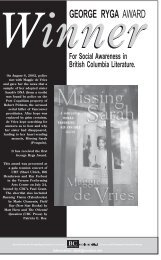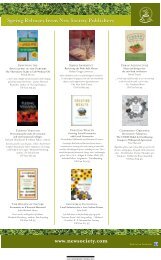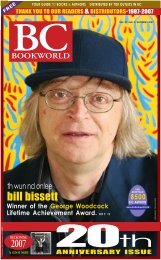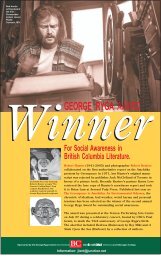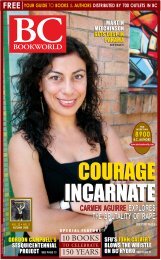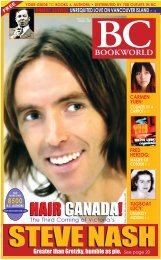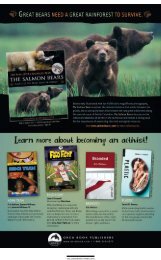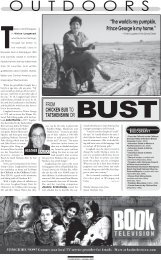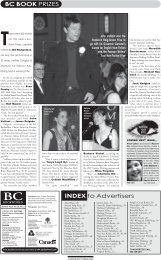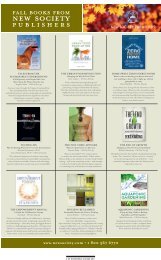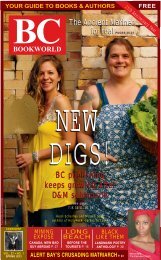BC letters - BC BookWorld
BC letters - BC BookWorld
BC letters - BC BookWorld
Create successful ePaper yourself
Turn your PDF publications into a flip-book with our unique Google optimized e-Paper software.
14 <strong>BC</strong> BOOKWORLD SUMMER 2009<br />
25<br />
F A M O U S<br />
LITERARY<br />
VISITORS<br />
WHEN RUDYARD KIPLING<br />
15<br />
first arrived in Vancouver,<br />
during his “wedding<br />
tour” of 1892, the<br />
City Solicitor, George<br />
Hamersley, a member<br />
of the Inner Bar, London,<br />
was asked if he might greet the visiting<br />
writer.<br />
“Kipling! Who the devil is Kipling”<br />
the lawyer reportedly said. “Never heard<br />
of the man!”<br />
That year Kipling greatly admired<br />
the efficiency of the Royal Canadian<br />
Mounted Police. “Always the marvel to<br />
which Canadians seem insensible,” he<br />
wrote, “was that on one side of an imaginary<br />
line should be Safety, Law, Honour<br />
and Obedience, and on the other,<br />
frank, brutal decivilization.”<br />
Kipling was so pleased with Vancouver<br />
that he purchased a town lot in the<br />
Mt. Pleasant area prior to embarking for<br />
Japan from the CPR dock on the Empress<br />
of India on April 4, 1892.<br />
“He that sold it to me was a delightful<br />
English boy,” Kipling later wrote in<br />
American Notes. “All the boy said was, ‘I<br />
give you my word it isn’t on a cliff or under<br />
water, and before long the town<br />
ought to move out that way.’ And I took<br />
it as easily as a man buys a piece of tobacco.<br />
RUDYARD<br />
KIPLING<br />
THE MOST ENTHUSIASTIC RECEPTION GIVEN<br />
to a visiting writer in British Columbia<br />
was accorded to Rudyard Kipling—<br />
the chief literary cheerleader for the British<br />
Empire—when he addressed the<br />
one-year-old Canadian Club at the Pender<br />
Hall in 1907. It was the same year he received<br />
the Nobel Prize for Literature.<br />
“I became owner of 400 well-developed<br />
pines, thousands of tons of granite<br />
scattered in blocks at the roots of the<br />
pines, and a sprinkling of earth. That’s a<br />
town lot in Vancouver.<br />
“You or your agent hold onto it till<br />
property rises, then sell out and buy<br />
more land farther out of town and repeat<br />
the process. I do not quite see how<br />
this sort of thing helps the growth of a<br />
town, but the English boy says it is the<br />
‘essence of speculation’ so it must be all<br />
right. But I wish there were fewer pines<br />
and rather less granite on the ground.”<br />
Kipling was duped. When he returned<br />
in 1907, he learned that he’d<br />
been paying taxes on property legally<br />
owned by someone else.<br />
Privately, Kipling wrote, “All the con-<br />
solation we got from the smiling people<br />
of Vancouver was: “You bought that<br />
from Steve, did you Ah-hah, Steve! You<br />
hadn’t ought to ha’bought from Steve.<br />
No! Not from Steve!’ And thus did the<br />
good Steve cure us of speculating in real<br />
estate.”<br />
In 1907, Kipling was met by the<br />
mayor, the Board of Trade and provincial<br />
government members. An audience<br />
of 500 attended his luncheon speech.<br />
Women weren’t invited; there was not<br />
enough room. But women came anyway,<br />
crowding the hall to its doors, filling<br />
the spectator gallery.<br />
After receiving a standing, cheering<br />
ovation and a Moroccan leather case,<br />
embossed with his initials, containing his<br />
honourary lifetime membership to the<br />
Canadian Club, Kipling rose to discourse<br />
on Vancouver.<br />
He compared the city to the head of<br />
an army bravely passing through the<br />
mountains “to secure a stable Western<br />
civilization facing the Eastern Sea.”<br />
Frequently interrupted by applause,<br />
he added, “If I had not as great faith as I<br />
have in our breed, and in our race, I<br />
would tremble at your responsibilities.”<br />
✍<br />
Kipling was a vitriolic racist, constantly<br />
spewing venom about Huns, Yids and<br />
Micks. He was equally contemptuous of<br />
trade unionists, liberals and suffragettes.<br />
Kipling’s rhetoric was taken seriously<br />
in B.C., an outpost of the empire.<br />
He ominously advised, “The time is<br />
coming when you will have to choose<br />
between the desired reinforcements of<br />
your own stock and blood, and the undesired<br />
races to whom you are strangers,<br />
whose speech you do not understand,<br />
and from whose instincts and traditions<br />
you are separated by thousands of years.”<br />
When asked by a reporter for the<br />
Vancouver World about “the all-absorbing<br />
topic of Hindoo immigration,”<br />
Kipling confided he “had come six thousand<br />
miles to study it.”<br />
✍<br />
Kipling was wildly enthusiastic about<br />
Victoria, having first visited in 1889. He<br />
wrote, “Real estate agents recommend<br />
it as a little piece of England—the island<br />
on which it stands is about the size of<br />
Great Britian—but no England is set in<br />
any such seas or so fully charged with<br />
the mystery of the larger ocean beyond....<br />
“I tried honestly to render something<br />
of the color, the gaiety, and the graciousness<br />
of the town and the island, but only<br />
found myself piling up unbelievable adjectives,<br />
and so let it go with a hundred<br />
other wonders.”<br />
Nary a word was printed about his<br />
property loss in Vancouver.<br />
Cartoon from the Vancouver Weekly<br />
News Advertiser, 1907<br />
“Such land is good for the energetic man. It is also not so bad for the loafer.”—RUDYARD KIPLING ON B.C.



